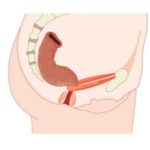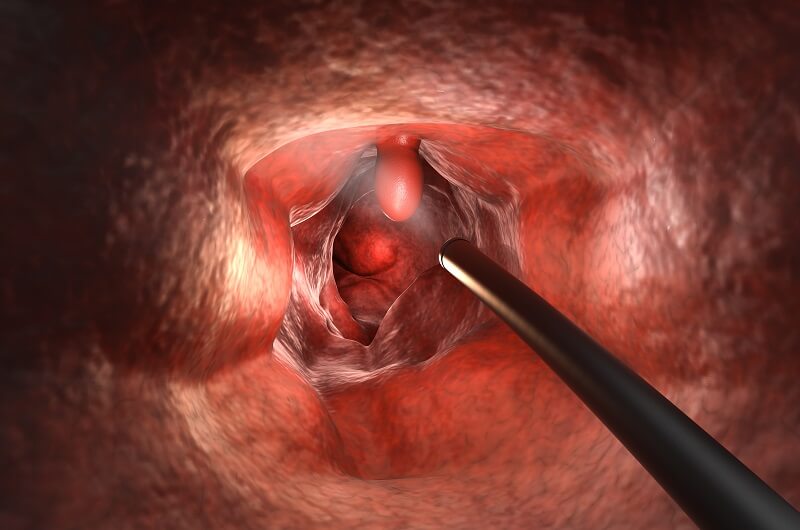Best Minimally-Invasive Treatment for Rectal Prolapse in a Daycare Procedure
You can now treat symptoms of rectal prolapse in a dayare procedure with the most effective, painless, and minimally invasive laparoscopic surgical method
Book Free Appointments With Our Expert Doctors
- Get free consultation for 50+ diseases
- In-person and online consultation with experienced doctors
- Extensive medical assistance throughout your treatment

According to the NABH Norms
No Cuts, No Wounds, Painless*
Insurance Paperwork Support
Web-View
Technology
What is rectal prolapse?
Rectal prolapse is a condition where the rectum protrudes from its normal position towards or outside the anus. Rectum is the last part of the large intestine and the opening through which stool exits the anus. Rectal prolapse can further cause fecal incontinence. Sometimes it can be treated with stool softeners and other medication. However, in serious conditions, it needs surgery to get repaired.
Book Your Appointment
Overview of rectal prolapse
→ Damage to the rectum
→ Death of the tissues of the rectum (gangrene)
→ Rectal bleeding
→ Bowel obstruction
→ Recurrence of rectal prolapse
→ Development of fecal incontinence
→ Narrowing of anal opening
→ Fistula
→ Worsening or development of constipation
→ 30% off on diagnostic tests
→ Confidential consultation
→ Single deluxe room
→ Free follow-ups post-surgery
→ 100% insurance claim
→ All Insurances covered
→ No upfront payment
→ No running behind insurance authorities
→ Paperwork by Surgicare team on your behalf
Causes of rectal prolapse

Chronic constipation or chronic diarrhea

Long-term history of straining during bowel movement

Injury to pelvic area or anal region

Weak anal sphincter

Malnutrition
Symptoms of rectal prolapse

Aging

Damage to nerves – pregnancy or spinal injury

Other diseases or conditions such as diabetes, Chronic Obstructive Pulmonary Disease (COPD), hysterectomy, infection in the intestine

Anal intercourse
Treatment of rectal prolapse

Diagnosis
The doctor will ask about your medical history, symptoms and past surgeries, if any. The doctor will also conduct a physical examination and may ask you to squat, strain or to mimic bowel movement. The doctor will insert a gloved finger into the anus to check the strength of the rectum and anal sphincter. He may ask you to get a colonoscopy, sigmoidoscopy or anal ultrasound to check for ulcers, polyps or tumors.
Surgery
There are two surgical procedures to treat rectal prolapse:
- Abdominal Repair through Open Surgery: In this approach, the doctor makes an incision in the abdominal area. It is usually performed under general anesthesia. The doctor places the rectum back in place. The surgeon may also remove a part of the colon in case of patients with chronic constipation.
- Laparoscopic rectopexy: This is another approach to treat rectal prolapse where the rectum is restored to its original position in the pelvis. It no longer protrudes into the anal region. The doctor makes small incisions in the abdomen and inserts a laparoscope. A laparoscope has a camera attached on top of it that will project the images of the internal structure on the monitor. The surgeon locates the sigmoid in the colon and rectum. The rectum is freed from its surroundings and lifted gently to its position. In some cases the doctor may remove a part of rectum, which he will discuss before the surgery itself. A mesh may or may not be placed to strengthen the area, depending on the condition. Finally, the incisions are closed with adhesive glue.
Why Surgicare ?
Surgicare is COVID-19 safe
our safety is taken care of by thermal screening, social distancing, sanitized clinics and hospital rooms, sterilized surgical equipment and mandatory PPE kits during surgery.
Post Surgery Care
We offer free follow-up consultations and instructions including dietary tips as well as exercises to every patient to ensure they have a smooth recovery to their daily routines.
Medical Expertise With Technology
Our surgeons spend a lot of time with you to diagnose your condition. You are assisted in all pre-surgery medical diagnostics. Our procedures are according to the norms of NABH.
Assisted Surgery Experience
A dedicated Medical Coordinator assists you throughout the surgery journey from insurance paperwork, to free commute from home to hospital & back and admission-discharge process at the hospital.
Frequently Asked Questions
How does a rectal prolapse look like?
There may be a feeling of bulge or a red-colored mass may protrude outside the anus. It can happen during or after a bowel movement. You may also notice fecal incontinence.
What are the factors responsible for rectal prolapse?
Some of the common factors responsible for rectal prolapse are- chronic constipation, excessive straining, malnutrition, injury to the pelvic area, damage to the nerves, etc.
Can rectal prolapse heal on its own?
Rectal prolapse gets worse with time. It will not heal on its own. Surgery is the only way to treat rectal prolapse.
Is it possible to prevent rectal prolapse?
Yes, in order to prevent rectal prolapse- avoid constipation, drink lots of water, exercise daily and include fiber-rich foods.
What happens if rectal prolapse is left untreated?
Some of the complications that can occur if rectal prolapse is left untreated include- rectal bleeding, bowel obstruction, fistula, narrowing of anal opening, etc. Hence, get treated if you are diagnosed with it as soon as possible.
What are the types of rectal prolapse?
There are mainly three types of rectal prolapse- inner, partial and complete.
Is it possible to fix rectal prolapse at home?
No, rectal prolapse is a condition that can be cured only with surgery. Hence, it cannot be treated at home.
What is the difference between hemorrhoids and rectal prolapse?
Hemorrhoids are swollen blood vessels that develop in or around the anal region. Whereas, rectal prolapse is the falling of rectum towards the anus. At the initial stage, rectal prolapse may look like hemorrhoids. It is important to consult a doctor in such situations.
Facts on Rectal Prolapse
- Rectal prolapse is common in adults with long-term chronic constipation.
- It is more common in women than in men, especially over 50 years.
- People who have partial or complete rectal prolapse need surgery for treatment.
Read More
Types of Rectal Prolapse
There are three types of rectal prolapse:- Internal Prolapse: The rectum starts to slip down but does not extend to the anus. It may usually happen in adults due to other intestinal problems such as polyp, tumor or other intestinal tissue growth.
- Partial Prolapse: It is also known as mucosal prolapse. A part of the rectum moves out of place and usually sticks to the anus. This happens when you strain during a bowel movement.
- Complete prolapse: The complete wall of the rectum falls down from its place and extends out of the anus. In this case, the prolapsed tissues may remain outside all the time.
How to prepare for rectal prolapse surgery?
The surgeon may ask the patient to follow the following instructions to prepare for rectal prolapse surgery.- Before the surgery, the surgeon will recommend keeping the surgical site clean and prevent the area from any kind of infection.
- If the patient is taking any medicines or supplements, the surgeon might ask to stop taking those.
What are the different surgical approaches for rectal prolapse treatment?
The surgical approach to treat rectal prolapse depends upon the severity of your rectal prolapse, age, health complications, and doctor’s expertise. Different surgical approach to treat rectal prolapse includes:- Laparoscopic surgery for rectal prolapse – The surgeon in this procedure makes tiny incisions on the abdomen. The surgeon inserts special surgical tools with a camera attached to it through the incision and repairing the rectal prolapse. In most cases, the surgery is carried out through a robotic approach.
- Open surgery for rectal prolapse treatment – This is the most conventional surgical approach to treat rectal prolapse. In this procedure, the surgeon makes an incision and pulls the rectum to fix it back in place. The surgeon may also use a mesh or suture to place the rectum. Once done, the incision is closed.
- Perineal recto-sigmoidectomy – In this surgical approach, the surgeon makes an incision, pulls the rectum through the anus, removes some unwanted portion of the rectum and places the remaining healthy rectum in the large intestine. This rectal prolapse repair is a little complicated and is performed only in people who cannot undergo any of the above-mentioned methods.
Recovery after laparoscopic surgery for rectal prolapse
Laparoscopic surgery for rectal prolapse is a safe surgical process and there are usually no complications reported in the procedure. But, the patient might take a few days time to recover completely and regain normal bowel functioning. The duration of complete recovery depends upon the surgical process that the patient has undergone. But irrespective of the process and condition, the patient should follow the following measures to ensure a risk-free and quick recovery.- Do not consume solid foods immediately after the surgery. Consume clear liquids for a few days.
- Drink enough water and juice.
- Use stool softeners to avoid constipation and straining during bowel movements.
- Practice pelvic floor exercises as recommended by the doctor.
Are rectal prolapse and hemorrhoids the same?
Rectal prolapse and hemorrhoids can often look similar considering their nature of occurrence. The two are different from each other, and have different causes and symptoms. Hemorrhoids or piles are swollen blood vessels in the rectum and anus. On the other hand, rectal prolapse is a condition in which the rectum displaces from its original position. In the case of rectal prolapse, only a segment of the bowel is involved which moves down. But in piles or hemorrhoids, only the inner layer of tissues, which is located near the anal opening, protrudes out. However, both rectal prolapse and hemorrhoids can lead to painful bowel movements and cause bleeding while passing stools.Know More About Surgicare ?
All humans deserve equal treatment but everyone cannot afford costly treatments at multispeciality or super-specialty hospitals.
In India, many people don’t even have mediclaim to deal with medical emergencies. Also, there is a lack of experienced professionals to consult for a second opinion in case of surgery. Surgicare & ICU is built keeping in view the above points. It offers surgery and post-surgery critical care.
Surgicare & ICU Hospital is well equipped for all kinds of surgeries and offers one of the best ICU teams of Vadodara to take care of critical patients. It offers help to all those patients who do not have mediclaim but need treatments. Surgicare & ICU offers the opportunity for second opinions.
